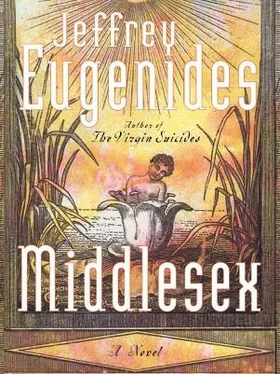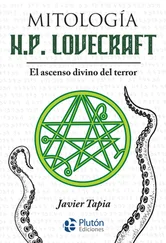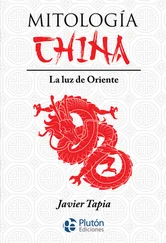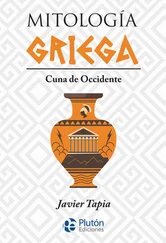For instance: Milton Stephanides graduating from Annapolis in 1949. His white hat flying up into the air. He and Tessie were stationed at Pearl Harbor, where they lived in austere marital housing and where my mother, at twenty-five, got a terrible sunburn and was never seen in a bathing suit again. In 1951 they were transferred to Norfolk, Virginia, at which point Chapter Eleven’s egg sac next door to mine began to vibrate. Nevertheless, he stuck around to watch the Korean conflict, where Ensign Stephanides served on a submarine chaser. We watched Milton’s adult character forming during those years, taking on the no-nonsense attributes of our future father. The U.S. Navy was responsible for the precision with which Milton Stephanides ever after parted his hair, his habit of polishing his belt buckle with his shirt sleeve, his “yes, sir”s and “shipshape”s, and his insistence on making us synchronize our watches at the mall. Under the brass eagle and fasces of his ensign’s cap, Milton Stephanides left the Boy Scouts behind. The Navy gave him his love of sailing and his aversion to waiting in lines. Even then his politics were being formed, his anti-communism, his distrust of the Russians. Ports of call in Africa and Southeast Asia were already forging his beliefs about racial IQ levels. From the social snubs of his commanding officers, he was picking up his hatred of Eastern liberals and the Ivy League at the same time as he was falling in love with Brooks Brothers clothing. His taste for tasseled loafers and seersucker shorts was seeping into him. We knew all this about our father before we were born and then we forgot it and had to learn it all over again. When the Korean War ended in 1953, Milton was stationed again in Norfolk. And in March of 1954, as my father weighed his future, Chapter Eleven, with a little wave of farewell to me, raised his arms and traveled down the waterslide into the world.
And I was all alone.
Events in the years before my birth: after dancing with Zoë at my parents’ wedding, Father Mike pursued her doggedly for the next two and a half years. Zoë didn’t like the idea of marrying someone either so religious or so diminutive. Father Mike proposed to her three times and in each case she refused, waiting for someone better to come along. But no one did. Finally, feeling that she had no alternative (and coaxed by Desdemona, who still thought it was a wonderful thing to marry a priest), Zoë gave in. In 1949, she married Father Mike and soon they went off to live in Greece. There she would give birth to four children, my cousins, and remain for the next eight years.
In Detroit, in 1950, the Black Bottom ghetto was bulldozed to put in a freeway. The Nation of Islam, now headquartered at Temple No. 2 in Chicago, got a new minister by the name of Malcolm X. During the winter of 1954, Desdemona first began to talk of retiring to Florida someday. “They have a city in Florida you know what it is called? New Smyrna Beach!” In 1956, the last streetcar stopped running in Detroit and the Packard plant closed. And that same year, Milton Stephanides, tired of military life, left the Navy and returned home to pursue an old dream.
“Do something else,” Lefty Stephanides told his son. They were in the Zebra Room, drinking coffee. “You go to the Naval Academy to be a bartender?”
“I don’t want to be a bartender. I want to run a restaurant. A whole chain. This is a good place to start.”
Lefty shook his head. He leaned back and spread his arms, taking in the whole bar. “This is no place to start anything,” he said.
He had a point. Despite my grandfather’s assiduous drink-refilling and counter-wiping, the bar on Pingree Street had lost its luster. The old zebra skin, which he still had on the wall, had dried out and cracked. Cigarette smoke had dirtied the diamond shapes of the tin ceiling. Over the years the Zebra Room had absorbed the exhalations of its auto worker patrons. The place smelled of their beer and hair tonic, their punch-clock misery, their frayed nerves, their trade unionism. The neighborhood was also changing. When my grandfather had opened the bar in 1933, the area had been white and middle-class. Now it was becoming poorer, and predominantly black. In the inevitable chain of cause and effect, as soon as the first black family had moved onto the block, the white neighbors immediately put their houses up for sale. The oversupply of houses depressed the real estate prices, which allowed poorer people to move in, and with poverty came crime, and with crime came more moving vans.
“Business isn’t so good anymore,” Lefty said. “If you want to open a bar, try Greektown. Or Birmingham.”
My father waved these objections aside. “Bar business isn’t so good maybe,” he said. “That’s because there’s too many bars around here. Too much competition. What this neighborhood needs is a decent diner.”
Hercules Hot Dogs™, which at its height would boast sixty-six locations throughout Michigan, Ohio, and southeastern Florida—each restaurant identified by the distinctive “Pillars of Hercules” out front—could be said to have begun on the snowy February morning in 1956 when my father arrived at the Zebra Room to begin renovations. The first thing he did was to remove the sagging venetian blinds from the front windows to let in more light. He painted the interior a bright white. With a G.I. business loan, he had the bar remodeled into a diner counter and had a small kitchen installed. Workmen put red vinyl booths along the far wall and reupholstered the old barstools with Zizmo’s zebra skin. One morning two deliverymen carried a jukebox in the front door. And while hammers pounded and sawdust filled the air, Milton acquainted himself with the papers and deeds Lefty had haphazardly kept in a cigar box beneath the register.
“What the hell is this?” he asked his father. “You’ve got three insurance policies on this place.”
“You can never have too much insurance,” Lefty said. “Sometimes the companies don’t pay. Better to be sure.”
“Sure? Each one of these is for more than this place is worth. We’re paying on all these? That’s a waste of money.”
Up until this point, Lefty had let his son make whatever changes he wanted. But now he stood firm. “Listen to me, Milton. You haven’t lived through a fire. You don’t know what happens. Sometimes in a fire the insurance company burns down, too. Then what can you do?”
“But three—“
“We need three,” insisted Lefty.
“Just humor him,” Tessie told Milton later that night. “Your parents have been through a lot.”
“Sure they’ve been through a lot. But we’re the ones who have to keep paying these premiums.” Nevertheless, he did as his wife said and maintained all three policies.
The Zebra Room I remember as a kid: it was full of artificial flowers, yellow tulips, red roses, dwarf trees bearing wax apples. Plastic daisies sprouted from teapots; daffodils erupted from ceramic cows. Photos of Artie Shaw and Bing Crosby adorned the wall, next to hand-painted signs that said enjoy a nice lime rickey! and our french toast is the toast of the town! There were photos of Milton putting a finishing-touch cherry on a milk shake or kissing someone’s baby like the mayor. There were photographs of actual mayors, Miriani and Cavanaugh. The great first baseman Al Kaline, who stopped in on his way to practice at Tiger Stadium, had autographed his own head shot: “To my pal Milt, great eggs!” When a Greek Orthodox church in Flint burned down, Milton drove up and salvaged one of the surviving stained glass windows. He hung it on the wall over the booths. Athena olive oil tins lined the front window next to a bust of Donizetti. Everything was hodgepodge: grandmotherly lamps stood next to El Greco reproductions; bull’s horns hung from the neck of an Aphrodite statuette. Above the coffeemaker an assortment of figurines marched along the shelf: Paul Bunyan and Babe the Blue Ox, Mickey Mouse, Zeus, and Felix the Cat.
Читать дальше
Конец ознакомительного отрывка
Купить книгу












